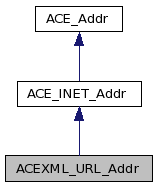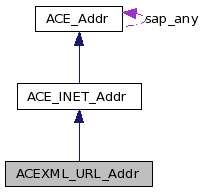#include <ACEXML/common/URL_Addr.h>


Public Member Functions | |
| ACEXML_URL_Addr (void) | |
| Initialization and termination methods. | |
| ACEXML_URL_Addr (const ACEXML_Char *host_name, const ACEXML_Char *path_name, unsigned short port=ACE_DEFAULT_HTTP_PORT) | |
| Constructor. | |
| ACEXML_URL_Addr (const ACEXML_URL_Addr &addr) | |
| Copy constructor. | |
| int | set (const ACEXML_URL_Addr &addr) |
| Essentially the copy constructor. | |
| virtual int | string_to_addr (const ACEXML_Char *address, int address_family=AF_UNSPEC) |
| virtual int | addr_to_string (ACEXML_Char *s, size_t size, int ipaddr_format=1) const |
| virtual const ACEXML_Char * | addr_to_string (int ipaddr_format=1) |
| void | operator= (const ACEXML_URL_Addr &addr) |
| Assignment operator. | |
| ~ACEXML_URL_Addr (void) | |
| Destructor. | |
| bool | operator== (const ACEXML_URL_Addr &SAP) const |
| bool | operator!= (const ACEXML_URL_Addr &SAP) const |
| Compare two addresses for inequality. | |
| virtual u_long | hash (void) const |
| Computes and returns hash value. | |
| const ACEXML_Char * | get_path_name (void) const |
| Return the path name. | |
| int | destroy (void) |
| Commit suicide. | |
Private Member Functions | |
| size_t | calculate_length (int ipaddr_format) const |
| Calculate the maximum length of the address string. | |
Private Attributes | |
| ACEXML_Char * | path_name_ |
| Our path name. | |
| ACEXML_Char * | addr_string_ |
| size_t | addr_string_len_ |
| Current length of the <addr_string_> | |
Defines a URL address family address format.
Definition at line 32 of file URL_Addr.h.
| ACEXML_URL_Addr::ACEXML_URL_Addr | ( | void | ) |
Initialization and termination methods.
Definition at line 18 of file URL_Addr.cpp.
: path_name_ (0), addr_string_ (0), addr_string_len_ (0) { }
| ACEXML_URL_Addr::ACEXML_URL_Addr | ( | const ACEXML_Char * | host_name, | |
| const ACEXML_Char * | path_name, | |||
| unsigned short | port = ACE_DEFAULT_HTTP_PORT | |||
| ) |
Constructor.
Definition at line 163 of file URL_Addr.cpp.
: ACE_INET_Addr (port, host_name), path_name_ (ACE_OS::strdup (path_name)), addr_string_ (0), addr_string_len_ (0) { }
| ACEXML_URL_Addr::ACEXML_URL_Addr | ( | const ACEXML_URL_Addr & | addr | ) |
Copy constructor.
Definition at line 129 of file URL_Addr.cpp.
: ACE_INET_Addr (), path_name_ (0), addr_string_ (0), addr_string_len_ (0) { if (this->set (addr) == -1) ACE_ERROR ((LM_ERROR, ACE_TEXT ("%p\n"), ACE_TEXT ("ACEXML_URL_Addr::ACEXML_URL_Addr"))); }
| ACEXML_URL_Addr::~ACEXML_URL_Addr | ( | void | ) |
Destructor.
Definition at line 173 of file URL_Addr.cpp.
{
ACE_OS::free (this->path_name_);
ACE_OS::free (this->addr_string_);
this->path_name_ = 0;
}
| int ACEXML_URL_Addr::addr_to_string | ( | ACEXML_Char * | s, | |
| size_t | size, | |||
| int | ipaddr_format = 1 | |||
| ) | const [virtual] |
Transform the current <ACE_INET_Addr> address into string format. If <ipaddr_format> is non-0 this produces "ip-number:port-number/path-name" (e.g., "128.252.166.57:80/~schmidt/"), whereas if <ipaddr_format> is 0 this produces "ip-name:port-number" (e.g., "www.cs.wustl.edu:80/~schmidt/"). Returns -1 if the <size> of the <buffer> is too small, else 0.
Definition at line 26 of file URL_Addr.cpp.
{
size_t total_len = this->calculate_length (ipaddr_format);
if (size < total_len)
return -1;
else
{
ACE_OS::sprintf (s, ACE_TEXT ("%s:%d/%s"),
ACE_TEXT_CHAR_TO_TCHAR (ipaddr_format == 0
? this->get_host_name ()
: this->get_host_addr ()),
this->get_port_number (),
this->get_path_name ());
return 0;
}
}
| const ACEXML_Char * ACEXML_URL_Addr::addr_to_string | ( | int | ipaddr_format = 1 |
) | [virtual] |
Transform the current <ACE_INET_Addr> address into string format. If <ipaddr_format> is non-0 this produces "ip-number:port-number/path-name" (e.g., "128.252.166.57:80/~schmidt/"), whereas if <ipaddr_format> is 0 this produces "ip-name:port-number" (e.g., "www.cs.wustl.edu:80/~schmidt/"). Uses dynamic memory, which is allocated on demand and deallocated when the object is destroyed. Returns -1 if dynamic memory fails, else 0.
Definition at line 46 of file URL_Addr.cpp.
{
size_t size = this->calculate_length (ipaddr_format);
if (size > this->addr_string_len_)
{
ACE_ALLOCATOR_RETURN (this->addr_string_,
(ACEXML_Char *) ACE_OS::realloc(this->addr_string_,
size), 0);
this->addr_string_len_ = size;
}
ACE_OS::sprintf (this->addr_string_,
ACE_TEXT ("%s:%d/%s"),
ACE_TEXT_CHAR_TO_TCHAR (ipaddr_format == 0
? this->get_host_name ()
: this->get_host_addr ()),
this->get_port_number (),
this->get_path_name ());
return this->addr_string_;
}
| ACE_INLINE size_t ACEXML_URL_Addr::calculate_length | ( | int | ipaddr_format | ) | const [private] |
Calculate the maximum length of the address string.
Definition at line 11 of file URL_Addr.inl.
{
return ACE_OS::strlen (ipaddr_format == 0 ?
this->get_host_name () : this->get_host_addr ())
+ ACE_OS::strlen ("65536") // Assume the max port number.
+ ACE_OS::strlen (this->get_path_name ())
+ sizeof (':')
+ sizeof ('/')
+ sizeof ('\0'); // For trailing '\0'.
}
| ACE_INLINE int ACEXML_URL_Addr::destroy | ( | void | ) |
Commit suicide.
Definition at line 60 of file URL_Addr.inl.
{
// Commit suicide.
delete this;
return 0;
}
| ACE_INLINE const ACEXML_Char * ACEXML_URL_Addr::get_path_name | ( | void | ) | const |
| ACE_INLINE u_long ACEXML_URL_Addr::hash | ( | void | ) | const [virtual] |
Computes and returns hash value.
Reimplemented from ACE_INET_Addr.
Definition at line 32 of file URL_Addr.inl.
{
u_long result = this->ACE_INET_Addr::hash ()
+ ACE::hash_pjw (this->get_path_name ());
return result;
}
| ACE_INLINE bool ACEXML_URL_Addr::operator!= | ( | const ACEXML_URL_Addr & | SAP | ) | const |
Compare two addresses for inequality.
Definition at line 48 of file URL_Addr.inl.
{
return !(*this == addr);
}
| ACE_INLINE void ACEXML_URL_Addr::operator= | ( | const ACEXML_URL_Addr & | addr | ) |
Assignment operator.
Definition at line 23 of file URL_Addr.inl.
{
if (this->set (addr) == -1)
ACE_ERROR ((LM_ERROR,
ACE_TEXT ("%p\n"),
ACE_TEXT ("ACEXML_URL_Addr::ACEXML_URL_Addr")));
}
| ACE_INLINE bool ACEXML_URL_Addr::operator== | ( | const ACEXML_URL_Addr & | SAP | ) | const |
Compare two addresses for equality. The addresses are considered equal if they contain the same IP address, port number, and path name.
Definition at line 40 of file URL_Addr.inl.
{
return ACE_OS::strcmp (addr.get_path_name (), this->get_path_name ()) == 0
&& addr.get_port_number () == this->get_port_number ()
&& addr.get_ip_address () == this->get_ip_address ();
}
| int ACEXML_URL_Addr::set | ( | const ACEXML_URL_Addr & | addr | ) |
Essentially the copy constructor.
Definition at line 142 of file URL_Addr.cpp.
{
ACE_OS::free (this->path_name_);
ACE_OS::free (this->addr_string_);
if (this->ACE_INET_Addr::set (addr) == -1)
return -1;
else
{
if (addr.path_name_)
ACE_ALLOCATOR_RETURN (this->path_name_,
ACE_OS::strdup (addr.path_name_),
-1);
if (addr.addr_string_)
ACE_ALLOCATOR_RETURN (this->addr_string_,
ACE_OS::strdup (addr.addr_string_),
-1);
this->addr_string_len_ = addr.addr_string_len_;
return 0;
}
}
| int ACEXML_URL_Addr::string_to_addr | ( | const ACEXML_Char * | address, | |
| int | address_family = AF_UNSPEC | |||
| ) | [virtual] |
Initializes an <ACEXML_URL_Addr> from the <address>, which can be "ip-number:port-number/path-name" (e.g., "www.cs.wustl.edu:1234/~schmidt/" "ip-number:port-number/path-name" (e.g., "128.252.166.57:1234/~schmidt"). If there is no ':' in the <address> it is assumed to be an ip-number or ip-address number, with the port number <ACE_DEFAULT_HTTP_PORT>.
Definition at line 76 of file URL_Addr.cpp.
{
if (s == 0)
return -1;
const ACEXML_Char* http = ACE_TEXT ("http://");
size_t http_len = ACE_OS::strlen (http);
// Check validity of URL
if (ACE_OS::strncmp (http, s, http_len) != 0)
ACE_ERROR_RETURN ((LM_ERROR, ACE_TEXT ("Invalid URL %s\n"), s), -1);
const ACEXML_Char* url = 0;
// Get the host name
for (url = s + http_len; *url != '\0' && *url != ':' && *url != '/'; ++url)
;
size_t host_len = url - s;
host_len -= http_len;
ACEXML_Char* host_name = 0;
ACE_NEW_RETURN (host_name, ACEXML_Char[host_len + 1], -1);
ACE_OS::strncpy (host_name, s + http_len, host_len);
host_name[host_len] = '\0';
ACE_Auto_Basic_Array_Ptr<ACEXML_Char> cleanup_host_name (host_name);
// Get the port number (if any)
unsigned short port = ACE_DEFAULT_HTTP_PORT;
if (*url == ':')
{
port = (unsigned short) ACE_OS::strtol (++url, 0, 10); // Skip over ':'
while ( *url != '\0' && *url != '/' )
++url;
}
// Set the addr
int result = this->ACE_INET_Addr::set (port, host_name);
if (result == -1)
return -1;
// Get the path name
const ACEXML_Char* path_name = 0;
if (*url == '\0')
path_name = ACE_TEXT ("/");
else
path_name = url;
ACE_ALLOCATOR_RETURN (this->path_name_, ACE_OS::strdup (path_name), -1);
return result;
}
ACEXML_Char* ACEXML_URL_Addr::addr_string_ [private] |
The dynamically created address string that's used for the <addr_to_string> method.
Definition at line 125 of file URL_Addr.h.
size_t ACEXML_URL_Addr::addr_string_len_ [private] |
Current length of the <addr_string_>
Definition at line 128 of file URL_Addr.h.
ACEXML_Char* ACEXML_URL_Addr::path_name_ [private] |
Our path name.
Definition at line 121 of file URL_Addr.h.
 1.7.0
1.7.0